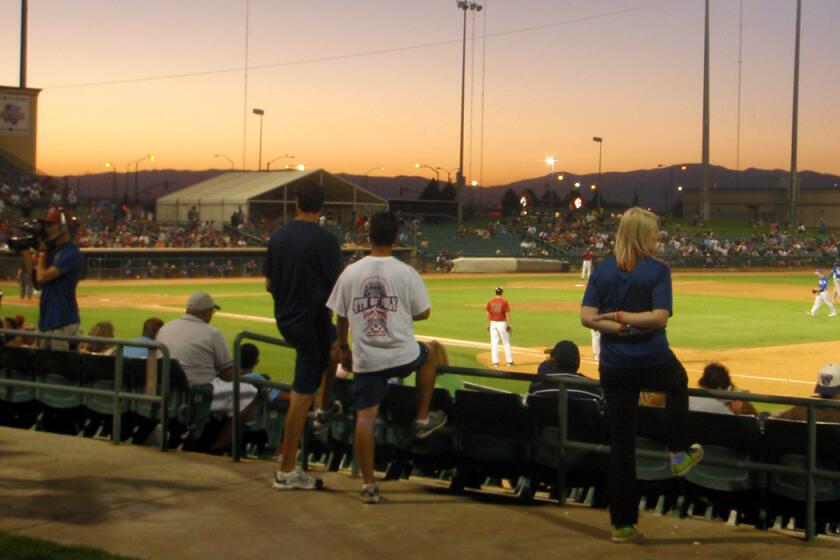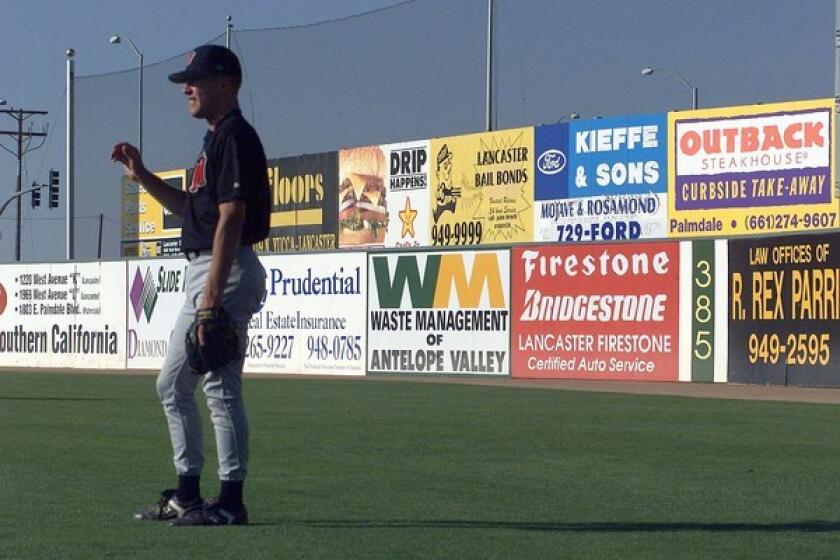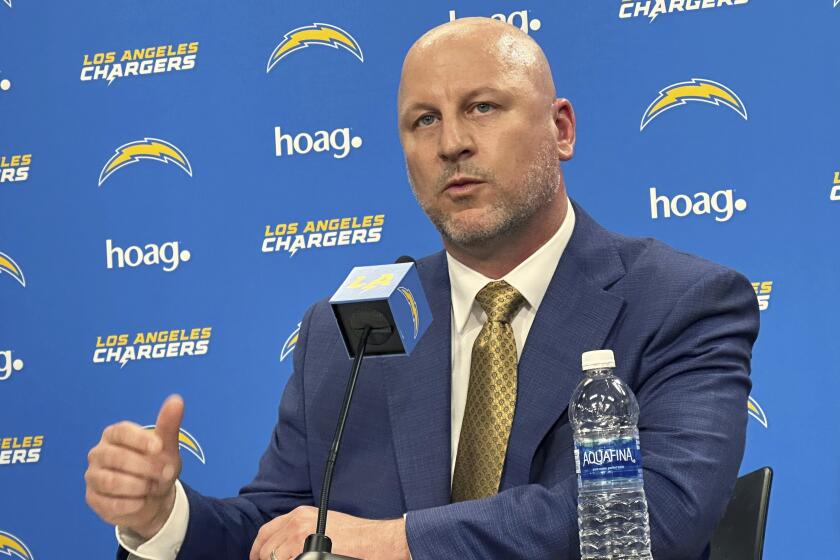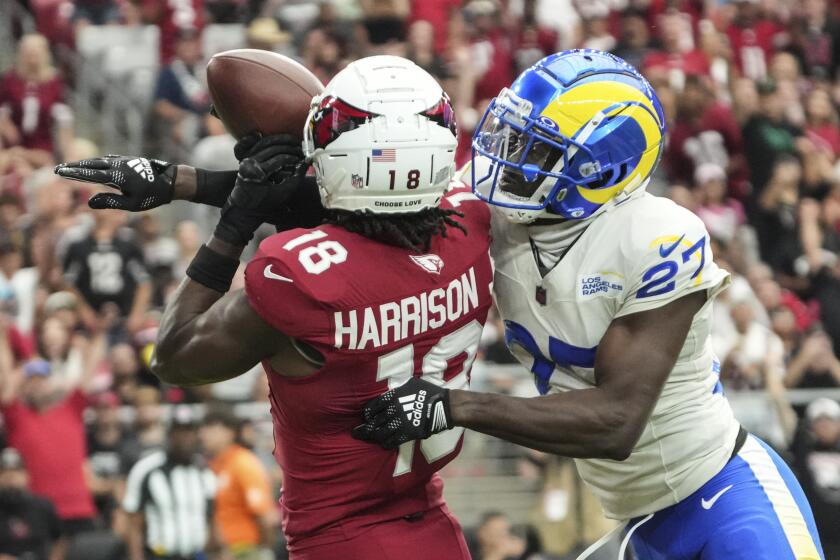Lancaster JetHawks wage an uphill battle with MLB to keep pro baseball at The Hangar
All they can do is pray.
The Lancaster JetHawks can do that, at least, at their ballpark. The pandemic wiped out the minor league season, but the JetHawks share their stadium with the community in ways they can: birthday parties, family events, church services.
On Saturday, a pastor will take the field, not a pitcher. So say a prayer for the JetHawks, because the team itself soon might be wiped out.
When major league owners last fall proposed killing off more than 40 minor league teams, minor league owners mobilized and politicians lined up to denounce the plan, from presidential candidate Bernie Sanders to House minority leader Kevin McCarthy, whose district includes Lancaster. Then came the pandemic, and the national crisis spared MLB from the glaring spotlight of Congressional hearings.
Now, MLB has effectively run out the clock. The working agreement between MLB and the minor leagues expires next week, and with it any obligation for major league teams to provide players to minor league teams. The president of the minors abruptly announced his retirement two weeks ago. Minor League Baseball, with capital letters in its name and independence for more than a century, will become a subsidiary of MLB.
The future of the Lancaster JetHawks was in doubt beyond this season. The coronavirus pandemic now has put 2020 in jeopardy.
The MLB argument: With advances in analytics, scouting and player development, 40-round drafts and short-season leagues are inefficient. Put the best prospects in the best facilities, and let MLB put its marketing muscle behind the minor leagues, a first step in a coordinated grow-the-game program that could extend from the majors and minors to college and youth baseball.
For some minor league owners — even ones whose teams will survive — this amounts to MLB executing a hostile takeover of the minors.
For the JetHawks, who were included on the initial list of teams targeted for elimination, they are left hoping for a stay of execution. There will be four minor league teams for each major league team, and the high desert winds are so fierce that major league teams are reluctant to send prospects to Lancaster.
“We’re pretty comfortable knowing that MLB is looking at a program regarding 120 clubs,” JetHawks general manager Andy Dunn said. “Who the 120 clubs are at this point, we still don’t have any answers.”
The Antelope Valley has grown into a population center. In Lancaster and neighboring Palmdale, the combined population tops 300,000. In three major league cities — Cincinnati, Pittsburgh and St. Louis — the population is about 300,000 each. The departure of the JetHawks would leave the Antelope Valley without any professional sports team.
“It would be devastating for the Antelope Valley to lose such a prominent pillar of the community,” Lancaster Mayor Rex Parris said.
After the 2016 season, California League teams in Adelanto and Bakersfield moved to North Carolina. If the JetHawks fold, the closest place to see a professional baseball game might be Dodger Stadium. That might be 65 or 70 miles on a map, but Lancaster city manager Jason Caudle knows how long that drive would take if he left City Hall on a weeknight at 5 p.m.
“Two hours and 15 minutes,” Caudle said.
Commissioner Rob Manfred told The Times last month that any city losing its minor league team need not lose baseball entirely.
“Every plan we have put forward with the minor leagues involved preserving some sort of baseball in every single community that currently has it,” Manfred said.
MLB this week announced partnerships with three independent leagues, and perhaps cities that lose their teams could be offered slots in those leagues, which offer a second chance for undrafted and unsigned players. Manfred also has said college summer leagues might expand to those cities.
Those options do not offer the charm of players affiliated with a minor league team. Lancaster fans can say they saw Jose Altuve and Alex Bregman play in the Astros’ farm system.
“Affiliated baseball is what this is about,” said Tom Backemeyer, the JetHawks’ executive vice president. “We don’t have any interest in any other league.”
Caudle said the city would not rule out any options for the city-owned stadium, but he said a minor league team remains the preferred choice. Since the stadium opened in 1996, according to city records, Lancaster has spent $30 million on it.
High Desert Mavericks Park, prices and contact info: Stater Bros.
“And we end up with a facility with, well, I don’t want to say worthless but, at the end of the day, it’s not housing baseball,” Caudle said. “That was the intent.”
The city could sue. In 2001, when MLB announced its plan to contract the Minnesota Twins, a court ordered the Twins to play and said the stadium operators would suffer “irreparable harm” if the lease were bought out.
The JetHawks’ lease extends through 2024, but MLB could offer to pay the city the remaining rent of $223,000 and call it the cost of doing business. MLB also could argue “baseball rules,” as defined in the lease, absolve the league of any financial responsibility.
“We’ve had meetings with everybody, to try to gather support, to make sure the JetHawks are around and viable,” Dunn said. “Everybody has done everything we’ve asked them to do.
“Now, we’re just waiting to find out what the conclusion is going to be.”
Perhaps a prayer would help. But given the street sign adjacent to the stadium parking lot, we may already have seen the last play at the ballpark on Double Play Way.
More to Read
Go beyond the scoreboard
Get the latest on L.A.'s teams in the daily Sports Report newsletter.
You may occasionally receive promotional content from the Los Angeles Times.













